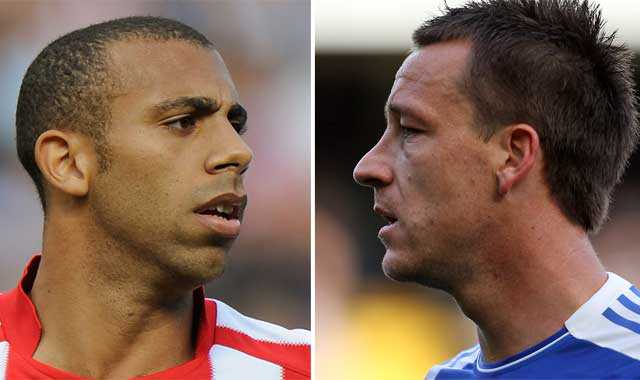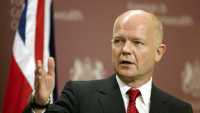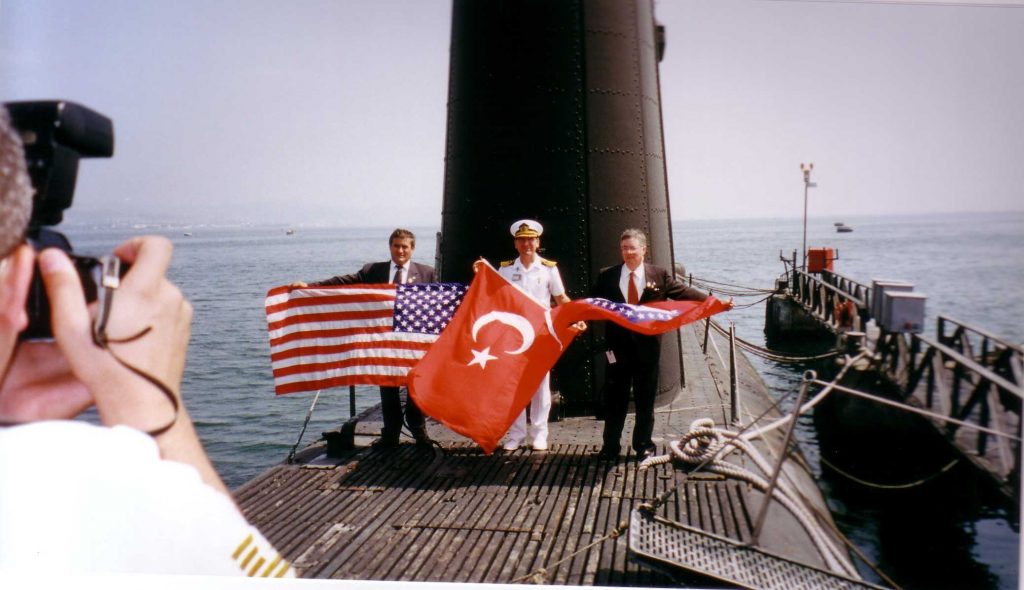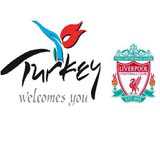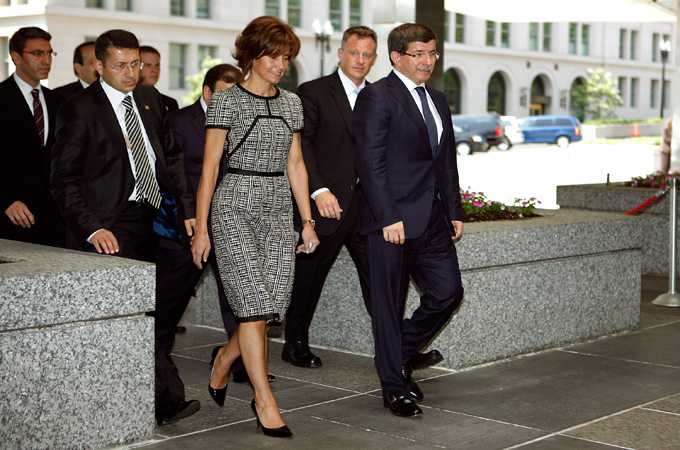
Turkey’s Foreign Minister Ahmet Davutoglu’s diplomatic skills combine intellectual authority with moral sensibility.
Davutoglu’s diplomatic skills have been compared to those of Henry Kissinger [GALLO/GETTY]
By a happy quirk of personal destiny I happened to be in Istanbul a few days ago when the Turkish Foreign Minister Ahmet Davutoglu gave a talk at the opening dinner session of the Istanbul Forum.
His theme was the Arab Spring as a defining historical moment of the post-Cold War era of world politics. I have made no secret of my admiration for the thought and creativity of Mr Davutoglu’s diplomacy. In his short period as foreign minister he has already made an indelible impact on regional and world affairs. I believe these exceptional contributions to the statesmanship are built on his academic studies carried out prior to his entry into government service.
Rarely in my experience has a major country allowed its foreign policy to be shaped by a non-politician whose intellectual authority and morally attuned sensibility is based on a truly distinctive mastery and blending of history, politics, law and culture as necessary components of a coherent strategic outlook.
One struggles for comparisons, finding a few impressive candidates. Perhaps the most obvious is the great Chinese Communist Foreign Minister between 1949-1958, Chou En-lai, who was renowned for his learning and pragmatically sound insights into the foreign policy challenges facing his country.
Yet the comparison falters because Chou’s thought and action were derivative from a totalising ideology, lacked freedom of maneuver in policy given Mao’s stern control of the Chinese state, and spent most of his career skillfully navigating a turbulent revolutionary situation within China.
Comparing Kissinger
Perhaps the only recent political figure that possesses influence and academic credentials comparable to Davutoglu is Henry Kissinger, but having proposed the comparison I need immediately to subvert it.
To begin with, Kissinger was a facilitator, not an architect or even an innovator. He was an adept amoral entrepreneur who successfully gained entry to the domains of the powerful, and while not a politician, always making himself available to do the dirty work of politics.
It is true that Kissinger and Davutoglu share an uncommon ability to think and explain clearly the most complex international challenges, and both seem endowed with inexhaustible reserves of superhuman energy to implement almost singlehandedly a multi-faceted foreign policy, and neither has much appetite for the economic dimensions of foreign policy, but here the comparison ends.
Kissinger is stained by his many prevarications and unprincipled approach: Extending the war in Vietnam to Cambodia in a manner that allowed, almost coerced, the extremist Khmer Rouge to abandon the countryside, and take over the cities and then harshly impose its will on the entire country by perpetrating one of the worst genocides in history; in the course of diplomatic negotiations to end the Vietnam War, threatening the North Vietnamese with nuclear weapons if they did not give in to American demands in the course of what were supposed to be peace talks; encouraging the military coup in Chile – ironically carried out on 9/11 (although in 1973); and then backing the notorious dictator, Pinochet, even endorsing Operation Condor, a pre-drone assassination programme that inflicted torture and terror on the people of Chile – especially its most idealistic and dedicated youth.
Despite his intellectual stature, formidable diplomatic skills and public recognition, Kissinger is far too compromised ethically and legally to be regarded in a positive light.
Davutoglu has served his government without making any such Faustian Bargains that exhibit ambition, international opportunism and political subservience rather than prudence, wisdom and above all, moral integrity. This quality of principled behaviour is what sets Davutoglu permanently apart from the Kissingers of this world, and as unusual as it is for someone of such qualities to rise to such governmental heights, it is probably rarer still, for the presiding politicians in government to welcome and reward such guidance.
In this respect, the citizens of Turkey should be grateful for the confidence and trust bestowed on Davutoglu by Prime Minister Erdogan and President Gul. It is they who have lifted him from academic obscurity to diplomatic eminence, and then appreciated and rewarded his many contributions to Turkish security and influence, as well as to peace and justice.
Republican inheritance
Perhaps, in this case, the fusion of private religious devotion and public service are connected in ways unique to Turkey that create political space needed for benevolence in government. And here, I think, but it is no more than a conjecture on my part, some credit needs to be given to the republican legacy of Kemal Ataturk.
I say this reluctantly, as an outsider peering inside Turkey through the narrow window slit of my limited knowledge and experience, but it does seem that Turkish secularism, despite its excesses, has allowed (for men at least) an effective fusion of religion, morality and politics.
Such a fusion was not possible elsewhere in the region, for instance in Iran where the Shah tried to mimic the West without establishing a credible republicanism. This undermined the moral and religious traditions deriving from the great Persian heritage in the course of embracing a form of modernity that privileged a small internationalised Iranian elite while consigning the mass of the people in seemingly permanent squalor.
In the process the Shah left nothing behind by way of constitutionalism on which to build a better Iranian future.
Despite its policy of ‘no problems with neighbours’, Turkey shifted support to protesters after the Arab Spring saying that governments had gone too far by shedding the blood of their own people [GALLO/GETTY]
Of course, significant blame for Iran’s trials and tribulations should be given to the British/CIA interventions that helped overthrow Iran’s most encouraging democratic movement led by Mohammed Mossadegh, a passionate nationalist. This intervention led to restoring the Iranian monarchy, which established an oppressive regime with the help of its foreign friends.
Mossadegh’s sin was to challenge Western interests by claiming the right to an independent foreign policy, especially by asserting Iranian sovereignty over natural resources through the nationalisation of the Anglo-Iranian Oil Company.
The Iranian Revolution of 1978-79 spun out of this moral and spiritual vacuum, but without the benefit of a secular tradition that was both populist and principled. Unfortunately, the new Iran went on to reproduce in theocratic form many of the deformities of power that finally led to the downfall of the Pahlevi monarchy despite its extensive apparatus of oppressive political rule and its strong support in Washington.
Kissinger for good reason praised the Shah of Iran in his memoir “as that rarest of things, an unconditional ally”. The concrete embodiments of this submissive Iranian role meant selling oil to apartheid South Africa, as well as opening up its national oil fields to mainly American energy companies and welcoming a huge US military presence in the country that included surveillance operations carried out in the Soviet Union from bases in Iran.
These comments on Iran are intended to point up the contrast with Turkey, and why someone of Davutoglu’s outlook could not possibly have risen to a position of influence in post-1979 Iran, and if somehow given such an opportunity, would likely have failed.
Before the Arab Spring
The relevance of this detour is to underscore the likely inadequacy of a foreign policy that is either cast adrift from the traditions of a society or that insists on embodying those traditions in a rigid form that is not flexible and normative (respectful of law and morality) enough to address effectively the complexities of the modern world.
What Davutoglu possesses as a result of this combination of religious devotion and cosmopolitan education is a sophisticated ability to navigate the waters of global society without getting drawn into power games at home and abroad that are by their nature cut off from principle. In this respect, Davutoglu will never receive or wish for Kissinger’s compliment of being an unconditional ally.
A principled ally must always retain the option to act independently, even oppositionally, as the occasion requires. In fact, Davutoglu has been chastised by Big Brother and his think tank minions for taking Turkey out of ‘its lane’ or chided for designing a foreign policy that was premised on the durability of the established order in the Middle East prior to Tahrir Square. And he has been criticised for allowing the relationship with Israel to move from friendship to hostility.
To be, on occasion, controversial in geopolitical circles is almost inevitable whenever a non-Western government seeks to forge its own path, to make its formal political independence into a foundation for existential sovereignty. If a Turkish foreign minister were never being criticised in either the West or East he would not be doing his job for Turkey or the world, and should be dismissed.
Without entering into a detailed examination of Turkish foreign policy in the Davutoglu years, it is essential to draw a line distinguishing a ‘before’ and ‘after’ in relation to the Arab Spring.
Before it was obviously economically beneficial and politically stabilising to pursue engagement with all countries in the Middle East. Such engagement was premised also on the importance attached to mutual respect for sovereignty, and ultimately, for self-determination. In this period of “zero problems of neighbours” Turkey raised its foreign policy profile in a positive manner that probably also reflected the heightened difficulties for Turkey of entering the European Union.
The result of these policies seemed to promise over time a mutually beneficial regionalism that also sought to minimise disruptive conflicts. In this regard Turkey made itself available to negotiate peace between Israel and Syria, encouraged the acceptance of Hamas as a political actor in relation to Israel, attempted to calm the buildup of war threats directed at Iran and reached out in peacekeeping initiatives to the Balkans and in the Caucasus.
Each attempt was worthwhile, done with tact, and produced an understandable mixture of successes and failures, although overall the economic gains in trade and investment and the diplomatic gains in conflict resolution were impressive.
After the Arab Spring
Then in January 2011 came the Jasmine Revolution in Tunisia and the effective challenge to the Mubarak autocracy in Egypt. These were remarkable uprisings with still indeterminate revolutionary possibilities, but also contain grave counterrevolutionary risks.
What happened in Tunisia and Egypt began happening elsewhere to varying degrees with very different responses: The fires of populist discontent burned brightly in Yemen, Bahrain, then Syria, Libya and less so in Morocco and Jordan.
Turkish reactions were measured, and initially used its diplomatic leverage to encourage compromises shaped to avoid bloodshed, especially in Libya and Syria, but as it became clear that the regimes would not accommodate democratic demands, Turkey shifted sides, openly aligning its hopes with the popular struggles.
More specifically, this even led to Turkish support for the UN mandated NATO intervention in Libya and increasingly confrontational relations with Syria. As Davutoglu explained, when a government shoots and kills its own unarmed citizens so as to retain power, then Turkey will side with such an opposition. In effect, respect for self-determination shifts its locus from the government to the people.
In my judgment these Turkish realignments were entirely appropriate so long as they did not cross the line of military intervention. In this regard, I would endorse the Turkish response to Syria while criticising its support for NATO’s regime-changing military intervention in Libya.
These ‘hard choices’ involve difficult decisions of policy in settings of extreme uncertainty as to the effects of deciding to intervene or not to intervene. Put differently, non-intervention can be a form of intervention in some settings. I would not agree with Davutoglu’s approach in every instance of Turkish foreign policy in the confusing and differentiated national unfoldings after the Arab Spring, but I would strongly affirm his principled approach based on this dramatic recalibration of foreign policy tactics and goals.
In the end, the brilliance of Davutoglu’s statecraft arises from his insistence on blending knowledge with principle.
Richard Falk is Albert G. Milbank Professor Emeritus of International Law at Princeton University and Visiting Distinguished Professor in Global and International Studies at the University of California, Santa Barbara. He has authored and edited numerous publications spanning a period of five decades, most recently editing the volume International Law and the Third World: Reshaping Justice (Routledge, 2008).
He is currently serving his third year of a six year term as a United Nations Special Rapporteur on Palestinian human rights.
The views expressed in this article are the author’s own and do not necessarily reflect Al Jazeera’s editorial policy.
 Fifa president Sepp Blatter is facing calls to step down after he said racist incidents in football matches could be settled with a handshake at the end of the game.
Fifa president Sepp Blatter is facing calls to step down after he said racist incidents in football matches could be settled with a handshake at the end of the game.